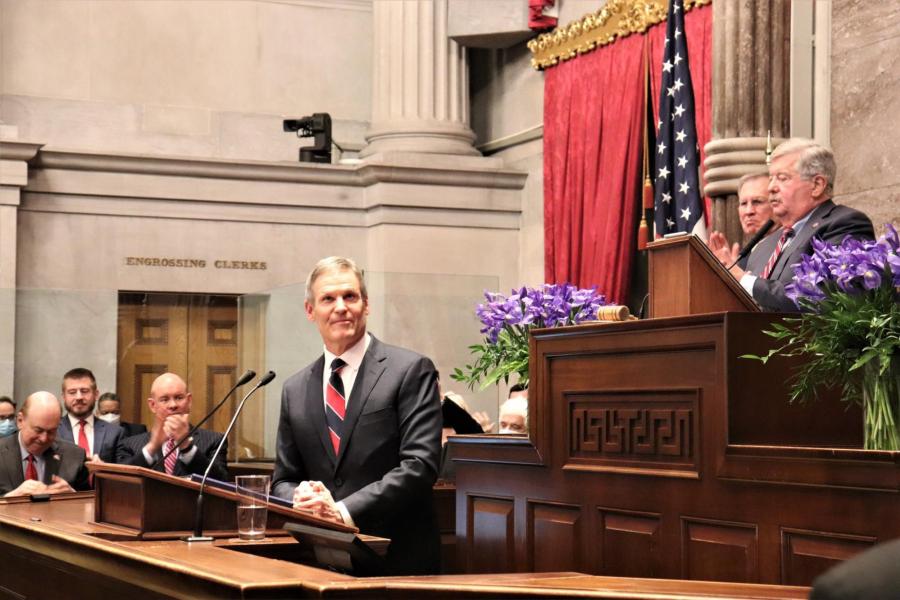Gov. Lee presents budget and legislative priorities

By Carole Graves
TML Communications Director
Tennessee Gov. Bill Lee presented his proposed budget and spending plan for the coming year during his annual State of the State Address, held Jan. 31 during a joint session of the Tennessee General Assembly.
The theme of his speech “America at its Best,” reinforced policies that support families, guard against “Big Government,” encourage fiscal stewardship, and power the economy.
"Tennessee stands as a beacon to the rest of the country for how we can change lives when we control the size of government, prioritize efficiency and make smart and responsible investments. I am proud to propose a budget and 'America at Its Best' policies that reinforce freedom, innovation, exceptionalism and optimism," Lee said
His proposed $52.6 billion budget includes strategic investments in K-12 education, higher education, improving transportation infrastructure and economic development.
Although short on details, the governor made his case for overhauling the state’s BEP funding formula for K-12 education, stating it was an outdated system with very little transparency.
"I didn't know a lot about public school funding at the time when I walked in the door, but I know that a 30-year formula that nobody likes probably ought to be redone," Lee said.
He urged lawmakers to pass his proposed overhaul of the state's $5.6 billion school funding formula along with $1 billion more to pay for it.
‘I'm proposing an innovative approach that sets aside dollars for each student, based on their individual needs, and these dollars will be used in whatever public school they attend,” he said.
Other investments in K-12 education include:
- $2.5M to expand the Future Workforce Initiative
- $124.7M to provide an increase into the teacher salary pool
- $16M recurring and $16M nonrecurring to the Charter Schools Facility Fund to increase the number of Charter Schools
- $550 million into one-time career and technical education grants, and
- $200 million to relocate 11 schools across the state which are located in flood plains.
“I went to Waverly after the devastating floods late last year,” he said. “The tragedy, the heartache, the loss was hard to take in. I walked into the elementary school where the water rose to four feet in 10 minutes. I saw desks and backpacks and books piled up against the door where water rushed out. If the Waverly flood happened on Friday instead of Saturday, we would be mourning the loss of hundreds of Tennessee children. I am proposing one-time funding to ensure that no student in Tennessee attends a public school located in a flood zone.”
In addition to the K-12 education funding priorities, here are other recommendations Gov. Lee is proposing for the fiscal year 2022-2023 budget:
Higher Education & Career Technical Education: $1.98 B
- $200 million for TCAT infrastructure investments to help double the skilled workforce by 2026
- $72 million to complete the Oak Ridge Innovation Institute, a partnership with the University of Tennessee to invest in data science and technology, advanced materials, and outcomes-based applications
- $75.2 million to increase the 4-year HOPE Award to $5,100 per student, per year, and the 2-year HOPE Award to $3,200 per student, per year
Transportation and Infrastructure: $627 million.
- $623 million for road infrastructure to accelerates projects listed in the IMPROVE Act and invests in transportation projects to ensure economic opportunity
Law and Safety: $601.6 million
- Adding 100 Highway Patrol Troopers, 20 Tennessee Bureau of Investigation Agents, and 25 Tennessee Bureau of Investigation Forensic Science Personnel
- Directing the Department of Safety and Homeland Security to create a plan so every house of worship in Tennessee can receive high-quality safety training
- $355.6 million in a Multi-Agency Law Enforcement Training Academy
- $28.4 million to fully fund the Correctional Officer salary changes
- $66 million for the TN Law Enforcement Hiring, Training, and Recruitment program
- $179 million to complete full construction of Tennessee Advanced Communications Network coverage, ensuring full mobile connectivity across all Tennessee for emergency communications and law enforcement
- $150 million to create the Violent Crime Intervention Grant Fund
Rural Tennessee
- $82 million to reimburse public hospitals for uncompensated care, primarily in rural communities
- $26 million for Rural Opportunity Grants, helping to get communities ready for corporate investment
- $55 million to increase access to services across each of the Medicaid Pathways to Independence programs
Rainy Day Fund, Debt & Liability reduction: $922 million.
The full speech can be found on the Governor’s website. See a complete budget overview.
